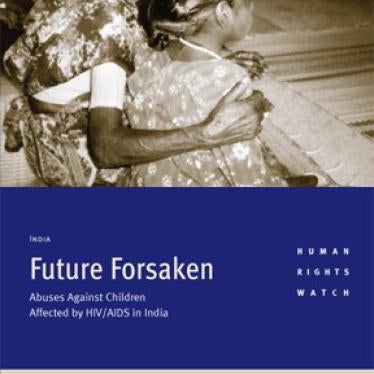(New Delhi) — India’s explosive AIDS epidemic is being fueled by widespread abuses against children who are affected by HIV/AIDS, Human Rights Watch said in a new report released today. The Indian government’s failure to address these abuses is undermining its anti-AIDS policy and putting millions of lives at risk.
The 209-page report, “Future Forsaken: Abuses Against Children Affected by HIV/AIDS in India,” documents that many doctors refuse to treat or even touch HIV-positive children. Some schools expel or segregate children because they or their parents are HIV-positive. Many orphanages and other residential institutions reject HIV-positive children or deny that they house them. Children from families affected by AIDS may be denied an education, pushed onto the street, forced into the worst forms of child labor, or otherwise exploited, all of which puts them at greater risk of contracting HIV.
“Children are being turned away from schools, clinics and orphanages because they or their family members are HIV-positive,” said Zama Coursen-Neff, senior researcher with Human Rights Watch’s Children’s Rights Division and author of the report. “If the Indian government is serious about fighting the country’s AIDS epidemic, it should stop ignoring children affected by AIDS and start protecting them from abuse.”
In India hundreds of thousands of children are living with HIV/AIDS, according to official statistics. Children of parents with HIV/AIDS suffer in turn: many are forced to withdraw from school to care for sick parents, are forced to work to replace their parents’ income, or are orphaned. Although the government has not conducted studies to assess the number of children affected by AIDS, some experts calculate that more than 1 million children under age 15 have lost one or both parents to HIV/AIDS. The Indian government estimates that 5.1 million people are living with HIV/AIDS in India.
Street children, child sex workers and children of sex workers, children from lower castes and Dalits (or “untouchables”) suffer even more as they also face other forms of discrimination. Sexual abuse and violence against women and girls, coupled with their long-standing subordination in Indian society, make them especially vulnerable to HIV transmission. Girls are also more likely to be pulled out of school to care for a sick family member or to take over domestic work. When living with HIV/AIDS, they may be the last in the family to receive medical care.
Many children—and the professionals who care for them—are not getting the information about HIV they need to protect themselves or to combat discrimination. Fewer than half of all secondary schools offer any AIDS education. Those that do teach about HIV/AIDS do so at an age when most children, especially girls, have already dropped out. And the government is utterly failing to provide information to millions of India’s children who are not in school but on the streets, at work, in institutions, in non-formal schools and at home.
“Children need accurate information to protect themselves from HIV/AIDS,” said Coursen-Neff. “But the most vulnerable children are those who’ve dropped out of school, and they’re the ones who are least likely to get lifesaving information about HIV prevention.”
Misinformation and fear also cause some families to reject children who are HIV-positive or who are perceived to be. Although some state governments, like that of Tamil Nadu, have begun programs to educate the public, most have not.
“Many teachers, doctors, government officials and ordinary people in India still don’t know the basic facts about HIV transmission and AIDS care,” Coursen-Neff said.
In addition, many HIV-positive children are denied medical care because government facilities are either unavailable or lack basic medical supplies. Struggling families caring for HIV/AIDS-affected children find it even harder to pay school fees and related costs, further preventing some children from attending school.
Some government officials have started to speak out about the need to reach children who are seen to be “innocent victims.” But children who face high risk of HIV, such as street children or child sex workers, are blamed for their “bad behavior” and their needs ignored.
Human Rights Watch called on the Indian government to take immediate action to:
- Enact and enforce legislation proscribing discrimination against people living with HIV/AIDS. Among other things, such legislation should specify that children may never be barred from school solely because they are HIV-positive.
- Ensure that children living with HIV/AIDS receive all available medical care, including antiretroviral treatment.
- Address school fees and related costs that keep children, especially girls, from going to school. Children in school are generally less vulnerable to HIV/AIDS.
- Provide care and protection to children whose parents are unable to care for them because of HIV/AIDS.
- Provide all children, both in and out of school, with comprehensive, accurate and age-appropriate information about HIV/AIDS.







